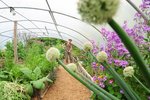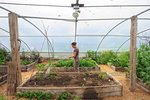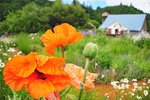



While “sustainable living,” “organic farming” and “alternative energy” have become commonly understood terms in our modern gardening vocabulary, “permaculture” remains a mystery to many outside of the environmental inner circle.
Marisha Auerbach of Herb’n Wisdom is working to change that.
Last Tuesday evening permaculture expert Auerbach presented a two-hour lecture to a small but dedicated audience at the Yard Birds Theater in Chehalis titled “How to Grow Your Own Produce in 2½ Years: An (r)Evolution Disguised as Organic Gardening.”
Auerbach flipped through slides of before and after views, detailing the process of converting the small grass yard of her rental home in southeast Olympia, into a permaculture garden.
Permaculture gardening, Auerbach said, is defined as “the art and science of creating community ecosystems in which plants, animals, and people interact to produce a fecund, ecologically sound perennial system that can support itself indefinitely.”
Permaculture is site specific and user specific.
“There’s no one way to do it,” said Auerbach. “You can create your own unique ‘food forest’ depending on the time, energy and resources you have available.”
“You can start small,” said Auerbach, “right outside your back door. You start with a nucleus and then you roll back the edge as you build and create more garden space over time.”
And, according to Auerbach, it’s less about self-sufficiency, and more about self-reliance in community and creating an efficient, self-regulating environment.
A permaculture garden or food forest is an environment that mimics the ecological system of a forest. Auerbach called it a “cultivated intentional forest,” a fully functioning ecosystem to attract, feed and shelter birds, insects, wildlife and humans alike. And, like a forest, the food forest consists of many layers — roots, vines, plants, shrubs, and trees — and provides a variety of functions:
• Food production
• Creation of homes for wildlife, insects, and birds
• Local herbal medicine production
• Stewardship of the local ecology, and even
• Beauty
Beauty, community, ethics and the inter-connectiveness of man with nature are important elements in permaculture gardening and make it unique among alternative farming systems.
Throughout the presentation Auerbach pointed to the art displayed in her gardens, as well as the artful display of the edible landscaping.
“I have a lot of art in my garden. Art in a garden is really important,” said Auerbach, “it entices people in.”
And aromatic plants, she said, were just as important for attracting human visitors as non-human.
For more information on permaculture, visit www.perma
cultureactivist.net, www.commoncircle.com, or Auerbach’s home farm at www.wildthymefarm.com.
•••
You can build new garden beds without ever touching a shovel or firing up a rototiller. It just takes time. According to Oakville permaculture consultant Marisha Auerbach.
Sheet mulch is put down in layers to mimic natural forest mulch by adding layers of cardboard, compost, and vegetative matter on top of existing lawns or weedy areas. Over the course of a few months, the mulch and the underlying sod and weeds decompose. Sheet mulching increases the population of beneficial soil microbes and worms, improves soil’s capacity to retain nutrients and water, and reduces weeds.
Follow these steps, being sure to soak each layer thoroughly with water before adding another layer:
1. Select your garden site.
2. Stamp or mow down the weeds. Pull any weeds with deep roots, like dandelions.
3. Lay down the cardboard. Remove tape and other things that won’t decompose. Overlap the layers so there are no holes.
4. Add a 2-inch layer of compost on top of the cardboard.
5. Add a 4-inch layer of mixed vegetative matter, such as grass clippings, leaves or straw.
6. Put mulch on top of the compost.
7. Water well and wait.
•••
Marisha Auerbach has been teaching permaculture design for more than 10 years and lives at the Wild Thyme Farm in Oakville. She is an Evergreen State College graduate with a focus in ethnobotany, ecological agriculture and sustainability.
Traveling throughout the Pacific Northwest, Auerbach presents a variety of workshops and courses, from two-hour lectures to two-week intensive, full-immersion workshops.
Auerbach is able to share her knowledge and passions on a variety of topics including: permaculture, polyculture gardening, flower and gem essences, local economics and community building, ethnobotany, herbalism, edible landscape design, and organic gardening.
For a full listing of workshops and lectures, go to www.herbnwisdom.com.
Permaculture is a site-specific art. Auerbach is available for consultations. You can reach her by e-mail at queenbee@herbnwisdom.com or by phone at (360) 273-7117.